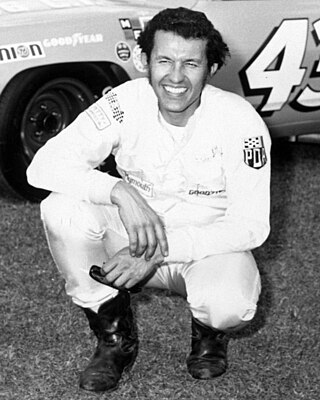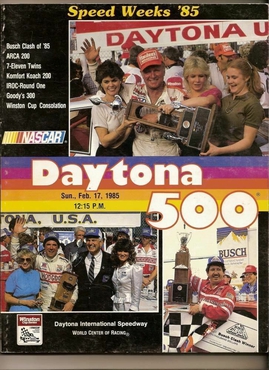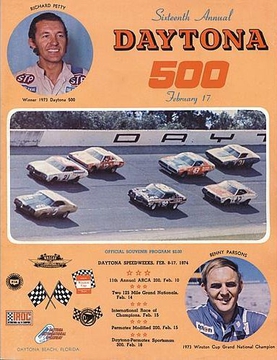
The Daytona 500 is a 500-mile-long (805 km) NASCAR Cup Series motor race held annually at Daytona International Speedway in Daytona Beach, Florida. It is the first of two Cup races held every year at Daytona, the second being the Coke Zero Sugar 400, and one of three held in Florida, with the annual fall showdown Straight Talk Wireless 400 being held at Homestead south of Miami. From 1988 to 2019, it was one of the four restrictor plate races on the Cup schedule. The inaugural Daytona 500 was held in 1959 coinciding with the opening of the speedway and since 1982, it has been the season-opening race of the Cup series.
The 1976 NASCAR Grand National Winston Cup Series was the 28th season of professional stock car racing in the United States, the 5th modern era season of the Grand National series and sixth under R. J. Reynolds sponsorship through its Winston cigarette brand. The season began on Sunday, January 18 and ended on Sunday, November 21. Cale Yarborough, driving the #11 Junior Johnson Holly Farms Chevrolet scored his first of three consecutive NASCAR Grand National Series Winston Cup Championships. Skip Manning was named NASCAR Rookie of the Year.

The 1974 NASCAR Winston Cup Series was the 26th season of professional stock car racing in the United States and the 3rd modern-era NASCAR Cup series. The season began on Sunday January 20 and ended on Sunday November 24. The first 15 races were shortened 10 percent due to the 1973 oil crisis. Following criticism of the 1972 and 1973 points systems that placed emphasis on completed miles, NASCAR implemented a new points system, that took basic purse winnings, multiplied by number of starts, and divided by 1,000; it was designed to more directly reward winning races, a response to Benny Parsons' championship the previous year with just one win. Richard Petty was Winston Cup champion at the end of the season finishing 567.45 points ahead of Cale Yarborough, while David Pearson finished a strong third in points despite only nineteen starts. Earl Ross was named NASCAR Rookie of the Year.

The 1979 Daytona 500, the 21st annual running of the event, was the second race of the 1979 NASCAR Winston Cup Series season. It was held on February 18, 1979 at Daytona International Speedway, in Daytona Beach, Florida. It has been called the most important race in stock car history.
The 1977 NASCAR Grand National Winston Cup Series was the 29th season of professional stock car racing in the United States and the 6th modern era NASCAR Cup series. The season began on Sunday, January 16 and ended on Sunday, November 20. Cale Yarborough driving the Junior Johnson #11 Holly Farms Chevrolet won his second consecutive NASCAR Grand National Series Winston Cup Championship. Ricky Rudd was crowned NASCAR Rookie of the Year.

The Coke Zero Sugar 400 is an annual NASCAR Cup Series stock car race at Daytona International Speedway. First held in 1959, the event consists of 160 laps, 400-mile (640 km), and is the second of two major stock car events held at Daytona on the Cup Series circuit, the other being the Daytona 500. From its inception in 1959 through 2019, it was traditionally held on or around the United States' Independence Day. In 1998, it became the first stock car race at Daytona to be held at night under-the-lights. In 2020, the race was moved to late August.

The 1985 Daytona 500, the 27th running of the event, was held on February 17, 1985, at Daytona International Speedway, in Daytona Beach, Florida.

The 1974 Daytona 500, the 16th running of the event, was won by Richard Petty after three hours, eleven minutes, and thirty-eight seconds of racing on February 17, 1974, at Daytona International Raceway in Daytona Beach, Florida, USA.

The 1978 Daytona 500, the 20th running of the event, was the second race of the 1978 NASCAR Winston Cup season. It was held on February 19 at Daytona International Speedway in Daytona Beach, Florida. Defending winner Cale Yarborough won the pole and Bobby Allison won the race.

The 1979 NASCAR Winston Cup Series was the 31st season of professional stock car racing in the United States and the 8th modern-era Cup series. It began on Sunday, January 14, and ended on Sunday, November 18. Richard Petty won his seventh and final Winston Cup championship, winning by 11 points over Darrell Waltrip. Dale Earnhardt was crowned NASCAR Rookie of the Year.

The 1977 Daytona 500, the 19th running of the event, was held on February 20, 1977, as the second race of the 1977 NASCAR Winston Cup Series Season.

The 1972 NASCAR Winston Cup Series was the 24th season of professional stock car racing in the United States and the 1st modern-era NASCAR Cup series season. The season began on Sunday January 23 and ended on Sunday November 12. Richard Petty won his second consecutive Winston Cup Championship and fourth overall. Larry Smith was named NASCAR Rookie of the Year.
The 1973 NASCAR Winston Cup Series was the 25th season of professional stock car racing in the United States and the 2nd modern-era Cup season. The season began on Sunday January 21 and ended on Sunday October 21. 31 races were scheduled in the 1973 season. 28 were held.

The 1975 NASCAR Grand National Winston Cup Series was the 27th season of professional stock car racing in the United States and the 4th season in the modern era of the NASCAR Cup series. The season began on Sunday, January 19 and ended on Sunday, November 12. Richard Petty, driving the #43 Petty Enterprises STP Dodge scored his sixth NASCAR Grand National Series Winston Cup Championship. Bruce Hill was named NASCAR Rookie of the Year. NASCAR introduced a new points system for 1975, a system designed by statistician Bob Latford. For the first time, each race on the NASCAR Winston Cup Grand National schedule carried an equal point value, a system that would be used for 36 seasons, from 1975 to 2010, with modifications in 2004 and 2007 each time by increasing the emphasis for a win in adding five additional points each time for a race winner. The original points system ran for the first 29 seasons, from 1975 to 2003.

The 1980 NASCAR Winston Cup Series was the 32nd season of professional stock car racing in the United States and the 9th modern-era NASCAR Cup season. It was the final year with the Gen 2 car. The season began on Sunday, January 13 and ended on Sunday, November 15. Dale Earnhardt won his first Winston Cup championship, winning by 19 points over Cale Yarborough. Jody Ridley was crowned NASCAR Rookie of the Year.

The 1974 National 500 was a NASCAR Winston Cup Series racing event that took place on October 6, 1974, at Charlotte Motor Speedway in Concord, North Carolina.
The 1978 NASCAR Grand National Winston Cup Series was the 30th season of professional stock car racing in the United States and the 7th modern era NASCAR Cup series. The season began on Sunday, January 22 and ended on Sunday, November 19. Cale Yarborough driving the Junior Johnson #11 First National City Travelers Checks Oldsmobile won his then record third consecutive NASCAR Grand National Winston Cup Winston Cup. Ronnie Thomas was crowned NASCAR Rookie of the Year in a tight battle with Roger Hamby.
This article documents historical records, statistics, and race recaps of the Daytona 500, held annually at Daytona International Speedway in Daytona Beach, Florida.

The 1973 Medal of Honor Firecracker 400 was a NASCAR Winston Cup Series race that took place on July 4, 1973, at Daytona International Speedway in Daytona Beach, Florida.

The 1975 Winston 500 was an automobile race at the Alabama International Motor Speedway on May 4, 1975.












